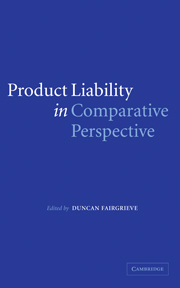Book contents
- Frontmatter
- Contents
- List of figures
- Foreword by Sir Michael Burton
- List of contributors
- Preface
- 1 Introduction
- PART I Country reports
- PART II European influences
- PART III Comparing systems
- 13 Harmonisation or divergence? A comparison of French and English product liability rules
- 14 Product liability law in Central Europe and the true impact of the Product Liability Directive
- 15 Bugs in Anglo-American products liability
- 16 Comparing product safety and liability law in Japan: from Minamata to mad cows – and Mitsubishi
- Appendix
- Index
16 - Comparing product safety and liability law in Japan: from Minamata to mad cows – and Mitsubishi
from PART III - Comparing systems
Published online by Cambridge University Press: 28 July 2009
- Frontmatter
- Contents
- List of figures
- Foreword by Sir Michael Burton
- List of contributors
- Preface
- 1 Introduction
- PART I Country reports
- PART II European influences
- PART III Comparing systems
- 13 Harmonisation or divergence? A comparison of French and English product liability rules
- 14 Product liability law in Central Europe and the true impact of the Product Liability Directive
- 15 Bugs in Anglo-American products liability
- 16 Comparing product safety and liability law in Japan: from Minamata to mad cows – and Mitsubishi
- Appendix
- Index
Summary
Mitsubishi, mad cows and Minamata
One of Japan's premier brand names, Mitsubishi, has come under severe pressure. On 24 March 2004, the Mainichi newspaper reported that Mitsubishi Fuso Truck and Bus Corporation (‘Fuso’, until recently part of Mitsubishi Motors Corporation or ‘MMC’) had announced the recall of an astonishing 113,000 large vehicles, admitting that defective hubs were the cause of wheels coming off and dozens of accidents. Over June, Fuso revealed that it had failed to report 159 cases of vehicle defects, causing 24 accidents resulting in injuries, 63 resulting in property damage, and 101 fires. On 6 May, seven former and current senior MMC executives were arrested on charges of false reporting to regulatory authorities, and professional negligence causing a death and injuries in Yokohama. On 10 June, moreover, other former MMC executives (including former president Katsuhiko Kawasoe) were arrested for professional negligence, involving another fatal truck accident in Yamaguchi Prefecture. Several, including Kawasoe, maintain their innocence, but Japanese prosecutors select their cases very carefully and therefore almost always succeed. Also in June, MMC announced a recall of another 170,000 smaller vehicles, involving seventeen passenger car models. MMC was reported to have confessed that it ‘hid twenty-six defects in its cars from regulators – in addition to four problems it publicised in 2000 – to avoid issuing recalls for the vehicles’. Déjà vu?
Pressure had actually been building on MMC from July 2000 when, after an insider tip-off, Japan's Transport Ministry conducted a spot inspection.
- Type
- Chapter
- Information
- Product Liability in Comparative Perspective , pp. 334 - 340Publisher: Cambridge University PressPrint publication year: 2005
- 3
- Cited by



